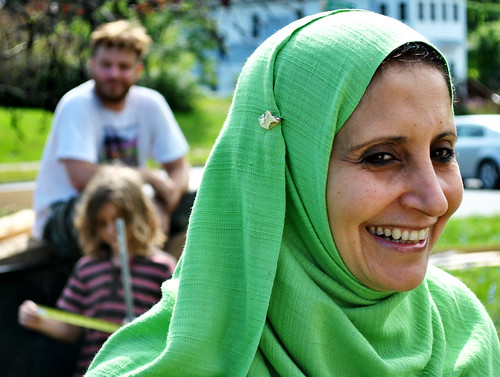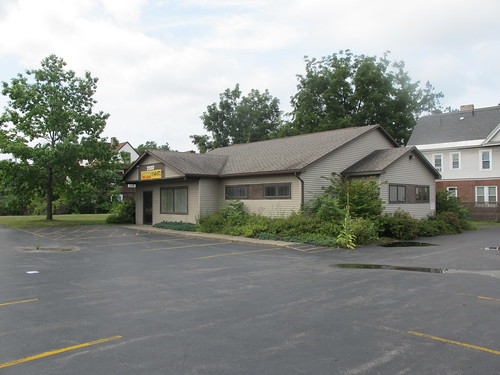Central New York’s first free clinic to receive the state health authorities’ stamp of approval will open for patients on the South Side Nov. 3, its founders say.
The Rahma Free Clinic, at 3100 S. Salina St., will initially be open two days a week, said Magda Bayoumi, who originated the idea for the project with her husband, Mohamed Khater. She said the clinic has been certified by the state Department of Public Health.

Starting a free clinic had long been a dream for Bayoumi, and it was a long road to get there. The idea of a free clinic came about just over nine years ago.
“I have been a volunteer in this city for 20 years. I look at where things are needed, and we needed this clinic a lot,” she said. Bayoumi and her husband presented the idea to a group of doctors, who agreed to support the clinic if the couple could get it built.
Although their idea generated enthusiasm, no one completely stepped forward to help with the heavy lifting a project like this would entail, she said. “They left it on us to build it,” she recalls. “We were a little discouraged.”
“Four years ago, we looked at each other and thought it was still a great idea,” Bayoumi added. The couple returned to their doctor friends and asked for help.
“You could consider us the facilitators. We found some doctors who would really get on board and support the project 100 percent,” Bayoumi said. “They put the seed money in to start.”
Bayoumi and Khater conducted a study of Syracuse emergency room cases and found that the majority were South Side residents with mainly routine health problems, such as abdominal pain or asthma, which could be treated in a clinic setting.
“In this population that doesn’t have a regular health care provider, they will really use the emergency room as their primary care physician,” explained Dr. Moustafa Hassan, director of Trauma and Emergency General Surgery at Upstate University Hospital and volunteer at the clinic. “This increases the load of emergency rooms tremendously. Our hospitals are so busy that you might wait eight hours for a minor problem.”
He said that many of those people were South Side residents, making the South Side the best location for a clinic.
“It was interesting because my husband and I were driving through the South Side, where we do not usually drive,” she said. “We saw a sign that said ‘Medical building for sale or rent.’ We felt like this was a sign from God. When we pitched the building owner the idea, he decided to be very generous and sell us the place, hold the mortgage for us, with no interest for five years.”
The clinic is tucked away behind a screen of greenery and a serene garden, making it appear unusual amid gas stations and the busy hum of South Salina Street.
The Rahma Edible Forest Snack Garden is also a part of the property. It is a project started almost two years ago and is run by Frank Cetera, who is excited to have the clinic next door.
“I am looking forward to integrating the people who come to the clinic into the garden activities,” he said. “We have been trying to work with local neighborhood residents to get more involved in the garden, and having the ability to interact with people who will start coming to the clinic will hopefully enable us to do a better job at that.”
Cetera hopes to encourage people to eat healthy and to create a landscape outside of the clinic that reflects the mission of what would be going on inside.

Bayoumi and Khater are coordinating with their volunteer doctors and deciding which days they would be able to give their time. Based on that, they will make a schedule of when the clinic will be open.
“We are going to start with being open two days a week and grow as the demand grows,” she said.
“It is going to be very unique,” Dr. Hassan believes. “The clinic will provide specialty services, including cardiology, neurology, rheumatology and surgery. It is not just a primary care clinic. People are willing to put in more hours here than they are at their actual jobs that they get paid for.”
The clinic will also offer dental care and access to social workers and case managers.
In October, the clinic held an open house to show the public what it had to offer. Bayoumi was overwhelmed by the community outreach to volunteer.
“It was amazing. People came to us saying ‘My friend could not make it, but she wanted to volunteer and asked me to put her name down.’ This community is really wonderful,” she said.
People volunteered to help anywhere they could, Bayoumi said. Those who have no medical background offered to help clean or do other tasks.
“We had one of our board members make 50 volunteer sheets and we all thought that was ambitious,” Bayoumi said with a laugh. “But at the end of the day, which was just four hours, we had every one of those sheets filled out and we had to use blank paper afterwards.”
Judy Kilpatrick was that board member, and she continued to find volunteers the following week at her job at Upstate. Kilpatrick is a clinical nurse among other positions and is motivated to help others because of the compassion of the other board members.
All of the board members are excited to see the clinic finally open.
“I am so excited about seeing that first patient come over that threshold,” Kilpatrick said. “I am looking forward to seeing people happy, that the care we deliver is excellent and that patients feel like they are really getting taken care of.”
For Hassan, it is about fulfilling a social justice.
“I hope that we will be a model for providing health care to the needy without profiling them as poor people, because anybody can lose their job and be without health insurance,” he said.
Hassan believes that health care is a basic human right.
“It is nothing more than social justice for people to have access to medical care; regardless of how much money they have, their religion, their race or whatever.”
“It is a dream come true,” Bayoumi said. “I have been dreaming for nine years. I am so excited that we will start to help people.”
 The Stand
The Stand

